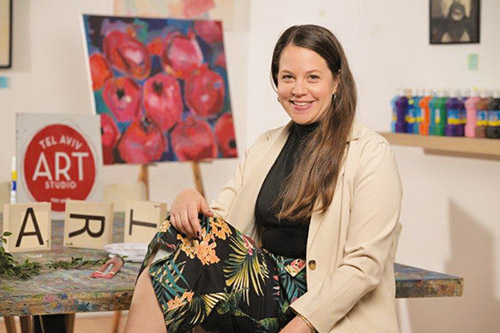

According to Israel’s Ministry of Defense, some 5,000 veterans are recognized as living with post-traumatic stress disorder. A host of NGOs and government-funded initiatives have been established to care for Israelis who gave their service to the country and are dealing with emotional trauma. One Israeli immigrant from Brewster, New York, a small town outside of Westchester County, has turned to art therapy to bring healing to IDF veterans with PTSD.
From a young age, Michal Berman remembers sitting on her porch and painting pictures of her yard. When her parents took her to classical music concerts, she would take pencil and paper and draw the orchestra. Especially for a bilingual child, art became a way for Berman to communicate and express herself in a nonverbal form, and she eventually became a professional artist.
After Berman received her undergraduate degree, she returned to Israel and served in the IDF as a shooting instructor. During her military service, she witnessed many soldiers struggling with depression and other mental health challenges. While other forms of therapy were offered to soldiers and veterans, art therapy was not in the mix. “I see how art therapy really makes a difference with people and really helps them explore,” Berman explained. “Even if you say you are completely fine starting off the session, it will always be in the art.”
At first Berman partnered with Natasha Miller Gutman, an immigrant and artist from South America to run an art studio in Tel Aviv, in 2018 Berman took over the studio. Her purpose was not only to provide healing, but to also use art as a medium for community building to bring together new immigrants with native Israelis. She envisioned a space where people of all backgrounds, regardless of their artistic abilities, can connect beyond the spoken word. She has seen many relationships formed as a result of the encounters around the easel—from platonic friendships to business relationships to romantic ones.
But her focus remains on therapy, specifically with IDF veterans. According to Berman, there is a stigma in Israeli society for men to talk about mental health. “During the therapy session we really break down those walls and show how it is OK to cry,” she shared.
Sessions last 50 minutes and span a variety of creative forms, including glass painting, macramé, ceramics, watercolor and more. Often a client will be silent during the creative process, but will discuss the artwork upon completion. The process is just as important as the product.
Small details such as how much pressure is applied to the brush and how the paper is being torn, are also observed. For many, the process itself of creating a piece of art, using one’s hands, and touching the different paints, is a therapeutic tool. For others, the artwork serves as a bridge to discuss their feelings.
Berman has worked with veterans who have been through war and other traumatic incidents on the battlefield. One of her clients was in a very depressive state and would not leave his home. “It took about 50 sessions for him to show advancement,” Berman said. “And now he is coaching other soldiers who went through trauma.”
Berman insists that there is still a lot of work necessary in Israeli society to break down the stigmas around mental health “and to make it a conversation piece that it’s OK to not be OK.” In the meantime, she hopes that her studio will continue to serve as a warm and welcoming space for those in need of emotional healing.
For more information, visit https://www.telavivartstudio.com/









